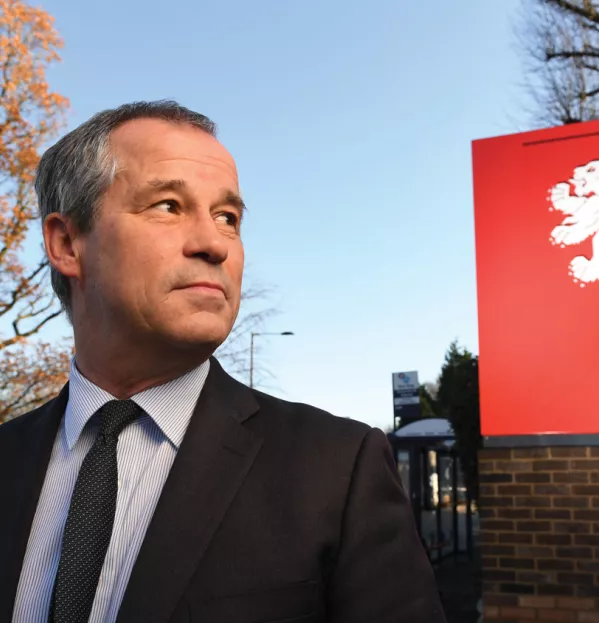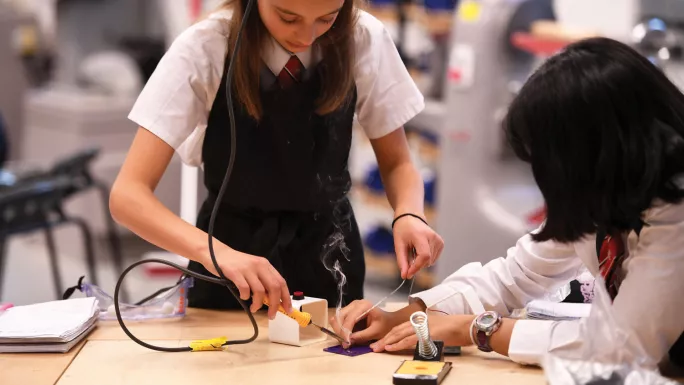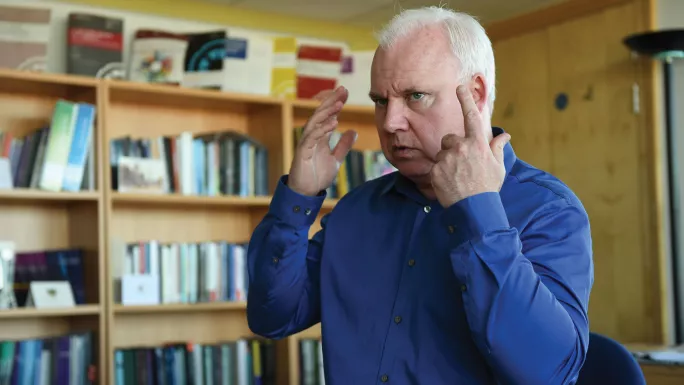How one university has created a school to ‘match the aspirations’ of the best

It has only been open for a year and a term, so it’s hard to tell if University of Birmingham School will be a success. But parents have already bet heavily on it: by the time lessons began, it had already become the most oversubscribed comprehensive in Britain’s largest local authority.
As one of two university training schools - the other is a primary run by the University of Cambridge - it faces intense scrutiny, with observers looking to settle the question of whether universities should have a role in running schools.
In opposite corners are two heavyweights: in one, the prime minister Theresa May, who wants universities to commit to sponsoring a school if they intend to raise fees. In the other, the University of Oxford’s vice-chancellor, Professor Louise Richardson, who has said that universities are not experts in running schools and are often global, rather than local, institutions.
Birmingham’s approach takes issue with this last claim. Establishing the school is intended to hark back to the vision of its founding chancellor, Joseph Chamberlain, who saw the institution as the first civic university, embedded within its local community.

“Right from the word go, we had to have a vision for the school that was more than just a school to train teachers,” says Professor James Arthur, director of the university’s Jubilee Centre for Character and Virtues, which helped to devise the secondary’s ethos.
The aim is to create a university training school that acts as a proving ground for the research of Birmingham’s School of Education, and to reflect the university’s sense of civic virtue. Its unusual admissions policy means that half the students are recruited from the local area and half from three “nodes” in deprived parts of the city that are short of school places.
Principal Michael Roden, the comprehensive-educated son of a steelworker, previously led the selective King Edward VI Camp Hill School for Boys. Three days into his new role, he says, he was told by the Department for Education that his task was to ensure that the links with the university were real.
Blueprint for others
So far the university has put its money where its mouth is. After the £23 million school opened, it became clear that science courses were oversubscribed, with 31 groups in the sixth form where 10 had been expected. The university is opening its chequebook to build more labs as a result.
This is far from the only example of higher education institutions running schools. But the government is demanding more - this year’s education Green Paper said that it “would like to see all universities…sponsor existing schools or set up new schools in exchange for the ability to charge higher fees”.

So the two flagship university training schools could end up creating a blueprint for the rest to follow. The aim of the trial scheme is to give teachers in the schools access to universities’ latest research and to provide training for new and existing teachers.
We talk about multiculturalism, but a lot of kids are going to schools where they just meet people like themselves
In Birmingham, it is too early for the school’s impact on training teachers to be felt. But the university’s name has already proved an asset, increasing the school’s popularity with the profession. Despite the recruitment crisis, it received 1,000 applications for the first 20 teaching jobs, with teachers attracted by the opportunities for CPD.
The benefits of the relationship will also flow in the other direction, as the school helps the university to achieve its goals on widening access. Two-fifths of pupils receive the pupil premium and there are 35 different ethnic groups. The school also explicitly aims to integrate pupils, creating tutor groups that mix up the intake from primary schools.
“This is a city which is largely monocultural,” Arthur says, referring to the segregation of students in their neighbourhoods and schools. “We talk a lot about multiculturalism, but in actual fact a lot of kids are going to schools where they just meet people like themselves.”

Perhaps unusually for a school led by a former grammar head, this principle of integration means that there is no setting or streaming in the school.
“The teachers find it really difficult,” Roden says. “We haven’t got huge numbers of classroom assistants. Is it a risk? Yes. But if you look at China, Finland, they don’t set. The best education systems in the world, the most successful, don’t do that.”
Filling ‘a cultural vacuum’
Arthur says that the focus on character education - building the ethos around values such as courage, justice and compassion - is intended as an antidote to many pupils’ prior experience at schools in special measures.
“What happens in those types of schools is that everything else disappears,” he says. “They become a sort of cultural vacuum. There are very few extracurricular activities. It’s all about literacy and numeracy, and passing exams.”
Here, there is no shortage of extracurricular options, thanks to an extended school day. On Fridays and Mondays, students take their pick from a menu of more than 70 activities, from cycling and yoga to chess and Chinese culture. In addition, Wednesday afternoons are given over to a rotating set of timetabled enrichment programmes.

Professor James Arthur helped to devise the secondary school’s ethos
“The whole school is set up to develop the character of the children and staff,” Roden says. “We have a taught character education programme. We integrate character education into every lesson where appropriate. We have five hours of enrichment built in.”
This has a practical side, too: it ensures that students applying to university will have plenty to talk about on Ucas personal statements and interviews. “It doesn’t matter what you want to do, you’re going to get to a position where the people that you’re competing with have got exactly the same qualifications as you,” Roden says.
But some pupils are taken aback to find results aren’t all that matters. PE teacher Hayley Stemp says she recently explained the ethos to one boy who was upset by his report grade: “Miss, I’m the best at rugby, why am I still the same level as him?” he asked. The answer was that he was being evaluated on a far wider range of skills. As she explained: “I’m looking at your leadership, your analysis, your fitness and your ability to help others, rather than just being able to run the fastest or throw the furthest.”
Arthur says that even character education can too often be directed solely at results, citing the trend towards programmes promoting resilience or grit as the route to exam and career success. “A lot of people who are members of criminal gangs or the mafia have got loads of resilience,” he adds. “Resilience has to have a moral purpose.”

This desire to emphasise the moral mission of character education comes alongside a downplaying of the accountability measures that dictate what happens in so many other institutions. The school isn’t using a replacement for national curriculum levels: only literacy and numeracy progress are tracked against a national database.
“This is the first time I’ve ever read an Ofsted framework - I never read one before. Even before an inspection,” Roden says.
It appears that what he has taken from his grammar experience is not the selective intake but the sense of independence that usually comes from the expectation of good results.
“What I’m trying to do here is to help lead a school where a comprehensive intake can match the aspirations and the enjoyment of learning and the progress of the very best schools in the world.”
You need a Tes subscription to read this article
Subscribe now to read this article and get other subscriber-only content:
- Unlimited access to all Tes magazine content
- Exclusive subscriber-only stories
- Award-winning email newsletters
Already a subscriber? Log in
You need a subscription to read this article
Subscribe now to read this article and get other subscriber-only content, including:
- Unlimited access to all Tes magazine content
- Exclusive subscriber-only stories
- Award-winning email newsletters